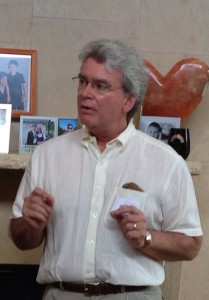To Dr. Gabe Garcia, rural living is what divides the “haves” from the “have nots” where good health care is concerned. As Professor of Medicine who also serves as Associate Dean of Medical School Admissions at Stanford University, Dr. Garcia has spent an entire career researching and teaching his students about the difference.
Dr. Garcia is Puente’s key partner at Stanford who will help oversee (and find staff for) the new South Coast mobile health clinic, which launches in early 2014.
Not only will his volunteer efforts with Puente result in health care services in La Honda and Pescadero, Dr. Garcia supports Puente’s mission as a dollar donor.
“How could you not fund this amazing organization?” He exclaims. “Puente is the social services agency of this community. There is no other. And the fact is that they are multi-dimensional. They really work at root causes of problems.”
Dr. Garcia welcomes this “root causes” approach; he believes that health care problems on South Coast exemplify the dichotomy between First World and Third World medical care he has observed elsewhere in the U.S.
Even in the bosom of Silicon Valley, a place of great wealth, thousands of locals lack regular access to a doctor. The problem is especially pronounced within Latino and farm worker populations, where unhealthy lifestyles themselves preclude access to healthy food, good water, and regular exercise
“There are things that someone who has lived in Latin America can easily see in the Latino parts of the United States,” says Dr. Garcia.
Born in Cuba and raised in Puerto Rico, Dr. Garcia was the first in his family to graduate from college. His family stayed healthy by making a point of eating healthful meals, drinking clean water and making regular visits to the doctor’s office. But he grew up seeing how disenfranchised people became when their social conditions prevented them from making a similar effort.
That’s how Dr. Garcia came to realize that to be truly effective, physicians need to “look upstream” for the myriad causes of chronic health problems in underserved communities – and seek to change those conditions when they can.
“I believe that physicians have a social responsibility, and they’re in a unique position to indentify systemic problems in the health care system. They’re sometimes in positions of authority in which their voices can be loud,” he says.
Dr. Garcia, with Ann Banchoff of the Office of Community Health, co-founded the Stanford Patient Advocacy Program, which places Stanford medical students as volunteers in local health clinics. He teaches his medical students that it is not only appropriate, but sometimes imperative for a physician to write op-eds; or to press local legislators for better health care for rural patients, just has he has done on behalf of South Coast residents.
Rural communities are in particular need of a champion. In addition to being isolated from county services like health care, rural residents generally have a less healthy lifestyle and are more likely to be obese than their urban counterparts.
This summer, Dr. Garcia is leading a service learning class in Oaxaca, Mexico, where he and his Stanford students look at issues of migration and health. Their ongoing work is helping to illuminate the kinds of health and healthcare issues that arise when Oaxacan migrants cross the border to work in the U.S. or leave to seek work in Mexico. Pescadero has its fair share of Oaxacan migrant workers, as well.
“I believe the logical extension of a classroom-based approach is to have action at the end,” says Dr. Garcia. “With Puente, it’s nice to find an organization whose values you share.”
To donate to Puente, visit https://rally.org/puente. To learn more about volunteering with Puente, contact Abby Mohaupt at amohaupt@mypuente.org or (650) 879-1691.





